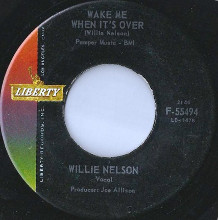
Red Headed Stranger is the eighteenth studio album by American outlaw country singer Willie Nelson and released in 1975. After the wide success of his recordings with Atlantic Records, coupled with the negotiating skills of his manager, Neil Reshen, Nelson signed a contract with Columbia Records, a label that gave him total creative control over his works. The concept for the album was inspired by the "Tale of the Red Headed Stranger", a song that Nelson used to play as a disc jockey on his program in Fort Worth, Texas. After signing with Columbia, he decided to record the song, and arranged the details during his return to Austin, Texas from a trip to Colorado. It was recorded at low cost at Autumn Sound Studios in Garland, Texas. The songs featured sparse arrangements, largely limited to Nelson's guitar, piano and drums. Nelson presented the finished material to Columbia executives, who were dubious about releasing an album that they at first thought was a demo. However, Nelson had creative control, so no further production was added.

Stardust is the twenty-second studio album by Willie Nelson, released in April, 1978. Its ten songs consist entirely of pop standards that Nelson picked from among his favorites. Nelson asked Booker T. Jones, who was his neighbor in Malibu at the time, to arrange a version of "Moonlight in Vermont". Impressed with Jones's work, Nelson asked him to produce the entire album. Nelson's decision to record such well-known tracks was controversial among Columbia executives because he had distinguished himself in the outlaw country genre. Recording of the album took only ten days.

Shotgun Willie is the sixteenth studio album by Willie Nelson, released in 1973. The recording marks a change of style for Nelson, who later stated that the album "cleared his throat". When Nelson refused to sign an early extension of his contract with RCA Records in 1972, the label decided not to release any further recordings. Nelson hired Neil Reshen as his manager, and while Reshen negotiated with RCA, Nelson moved to Austin, Texas, where the ongoing hippie music scene at the Armadillo World Headquarters renewed his musical style. In Nashville, Nelson met producer Jerry Wexler, vice president of Atlantic Records, who was interested in his music. Reshen solved the problems with RCA and signed Nelson with Atlantic Records as their first country music artist.
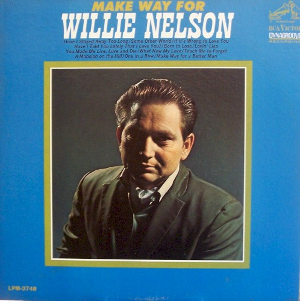
Make Way for Willie Nelson is the fifth studio album by country singer Willie Nelson.

...And Then I Wrote is the debut studio album by country singer Willie Nelson, recorded during August and September 1962 and released through Liberty Records.

"Bloody Mary Morning" is a song written and recorded by American country music singer Willie Nelson. Nelson wrote the song inspired by his struggles to become a "better parent". It was originally released in the 1970 RCA Records release Both Sides Now with the title "Bloody Merry Morning".
The Western Express was a country-music radio show transmitted by KCNC in Fort Worth, Texas. The show started in 1947, hosted by disk jockey Charlie Williams. In 1956, the station later hired Willie Nelson, a then struggling singer-songwriter who previously worked on different radio stations. Nelson hosted the three-hour-long show singing his original songs, taking calls and playing records.
The Pedernales Country Club is a complex located in Lake Travis, 29 miles west of Austin, Texas, United States. Originally the Briarcliff Yacht and Golf Club, a nine-hole golf course constructed in 1968, it was purchased by country music singer-songwriter Willie Nelson in 1979. After the purchase, Nelson constructed a studio on the complex, designed by Chips Moman. The first recording on the studio was Nelson's release Tougher Than Leather and his collaboration with Merle Haggard Pancho and Lefty.
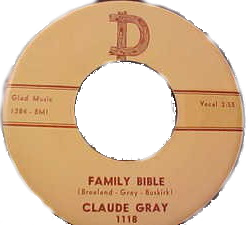
"Family Bible" is a song written by country music singer-songwriter Willie Nelson. Nelson began writing the song in 1957, while he enjoyed success as a disc jockey in KVAN, in Vancouver, Washington. After being denied a raise by the station, he moved to Houston, Texas. Due to financial issues he sold the song to Paul Buskirk.

"Mr. Record Man" is a song written by country music singer-songwriter Willie Nelson. After writing the song, Nelson moved to Houston, Texas, where due to his financial issues, tried to sell it to Larry Butler. Butler, who rejected to buy the song, employed Nelson instead. After his original songs turned into a hits for other artists, Nelson was signed as a recording artist by Liberty Records.
"The Storm Has Just Begun" is a song by country music singer-songwriter Willie Nelson. Nelson wrote the song at the age of twelve. While working for KBOP in Pleasanton, Texas, in 1955, the song was one of the first two ever recorded by Nelson.

"Willingly" is a duet by American country music singer Willie Nelson and Shirley Collie, produced by Joe Allison during Nelson's third session for Liberty Records. Released in March 1962, the album reached number ten on Billboard's Hot Country Singles.
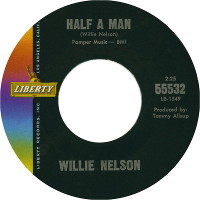
"Half a Man" is a song written and recorded by American country music singer Willie Nelson. The song was released as the A-side of the single for his second Liberty Records album, Here's Willie Nelson. Despite receiving mixed airplay for its content, the song became a sales success, peaking at number twenty-five on Billboard's Hot Country Singles and number twenty on Cashbox's country singles.
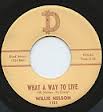
"What a Way to Live" is a song written by country music singer Willie Nelson. He recorded the song on his second session with D Records, after moving to Houston, Texas. Produced by Bill Quinn, it was cut at Gold Star Studios in March 1960.

"The Part Where I Cry" is a song written by country music singer Willie Nelson. After moving to Nashville in 1960, leveraged by the success of his songwriting, and helped by Harlan Howard, Nelson was signed by Joe Allison of Liberty Records.

"Touch Me" is a song written and recorded by American country music singer Willie Nelson. Leveraged by the success of his songs, Nelson moved to Nashville in 1960. Through songwriter Harlan Howard, Nelson was signed to write for Pamper Music, and to a recording contract with Liberty Records.

"The Party's Over" is a song written and recorded by American country music singer Willie Nelson during the mid-1950s. After arriving in Houston, Texas, Nelson was hired to play for the Esquire Ballroom band, where he would be allowed to close the shows singing the song. Guitar instructor and Nelson's friend Paul Buskirk forwarded the song to singer Claude Gray, who recorded the original version of the song, released as "My Party's Over" in 1959.

Red Headed Stranger is a song written by Edith Lindeman and Carl Stutz, published in 1953. Originally written for Perry Como, the song was not recorded by him due to publishing issues. In 1954, Arthur "Guitar Boogie" Smith released a version of the song on MGM Records that received good radio play.

"Pretty Paper" is a song written by country music singer-songwriter Willie Nelson in 1963. After being signed to Monument Records, Nelson played the song for producer Fred Foster. Foster pitched the song to Roy Orbison, who turned it into a hit. Nelson recorded his own version of the song in November 1964.

"Blackjack County Chain" is a song written by Red Lane. The song was initially rejected by Charley Pride, who considered at the time the lyrics controversial.
